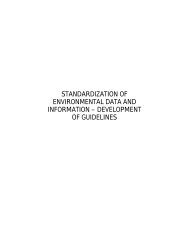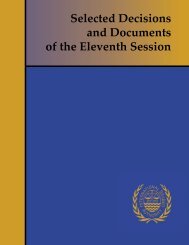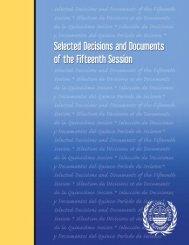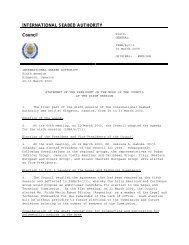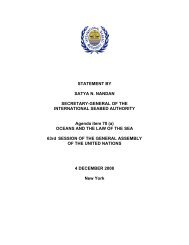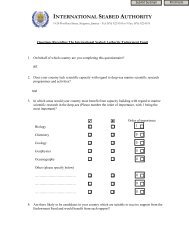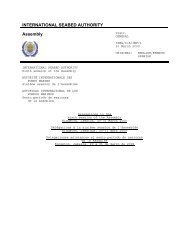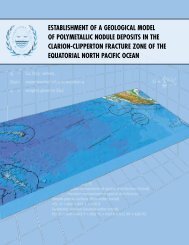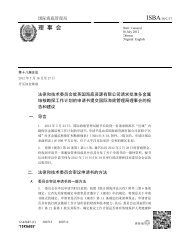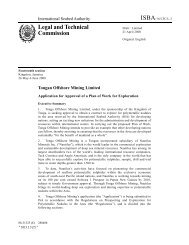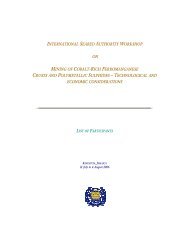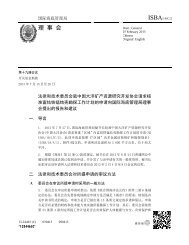- Page 2 and 3:
Contents i Compendium of Basic Docu
- Page 4 and 5:
Contents iii Introductory Note This
- Page 6 and 7:
Contents v Table of Contents Page F
- Page 8 and 9:
Contents vii SUBSECTION B. RULES AP
- Page 10 and 11:
Contents ix Article 59. Basis for t
- Page 12 and 13:
Contents xi Article 103. Definition
- Page 14 and 15:
Contents xiii Article 143. Marine s
- Page 16 and 17:
Contents xv Article 172. Annual bud
- Page 18 and 19:
Contents xvii SECTION 5. INTERNATIO
- Page 20 and 21:
Contents xix Article 244. Publicati
- Page 22 and 23:
Contents xxi Article 280. Settlemen
- Page 24 and 25:
Contents xxiii Article 4. Qualifica
- Page 26 and 27:
Contents xxv Article 13. Competence
- Page 28 and 29:
Contents xxvii Article 7. Expenses.
- Page 30 and 31:
Contents xxix Regulation 5. Annual
- Page 32 and 33:
Contents xxxi Regulation 40. Resour
- Page 34 and 35:
Contents xxxiii PART II. CONSERVATI
- Page 36 and 37: Contents xxxv Article 39. Accession
- Page 38 and 39: Contents xxxvii FINAL ACT OF THE UN
- Page 40 and 41: Contents xxxix PREPARATORY COMMISSI
- Page 42 and 43: Foreword Contents xli It finally se
- Page 44 and 45: Contents Foreword xliii Provisions
- Page 46 and 47: Contents Foreword xlv development,
- Page 48 and 49: 2 Convention: art 1 security, coope
- Page 50 and 51: 4 Convention: arts. 6-8 Article 6 R
- Page 52 and 53: 6 Convention: arts. 13-16 Article 1
- Page 54 and 55: 8 Convention: arts. 20-22 (h) any a
- Page 56 and 57: 10 Convention: arts. 26-27 3. The c
- Page 58 and 59: 12 Convention: arts. 32-35 ment shi
- Page 60 and 61: 14 Convention: arts. 39-41 3. Any a
- Page 62 and 63: 16 Convention: arts. 43-46 5. The f
- Page 64 and 65: 18 Convention: arts. 48-51 Article
- Page 66 and 67: 20 Convention: arts. 54-56 9. In de
- Page 68 and 69: 22 Convention: art. 60 arises betwe
- Page 70 and 71: 24 Convention: art. 62 3. In giving
- Page 72 and 73: 26 Convention: art. 67 by the estab
- Page 74 and 75: 28 Convention: art. 70 4. Developed
- Page 76 and 77: 30 Convention: arts. 74-75 2. Arres
- Page 78 and 79: 32 Convention: art. 77-78 nautical
- Page 80 and 81: 34 Convention: arts. 83-85 3. A dev
- Page 82 and 83: 36 Convention: arts. 91-94 Article
- Page 84 and 85: 38 Convention: arts. 97-100 Article
- Page 88 and 89: 42 Convention: arts. 112-113 3. The
- Page 90 and 91: 44 Convention: arts. 118-120 Articl
- Page 92 and 93: 46 Convention: arts. 124-126 PART X
- Page 94 and 95: 48 Convention: arts. 133-137 agreed
- Page 96 and 97: 50 Convention: arts. 141-143 locati
- Page 98 and 99: 52 Convention: arts. 145-146 (a) Th
- Page 100 and 101: 54 Convention: arts. 150-151 SECTIO
- Page 102 and 103: 56 Convention: art. 151 (f) (g) The
- Page 104 and 105: 58 Convention: art. 154 sponsored b
- Page 106 and 107: 60 Convention: art. 156 SECTION 4.
- Page 108 and 109: 62 Convention: art. 158 AGREEMENT,
- Page 110 and 111: 64 Convention: art. 159 SUBSECTION
- Page 112 and 113: 66 Convention: art. 160 (b) to elec
- Page 114 and 115: 68 Convention: ar1. 161 AGREEMENT,
- Page 116 and 117: 70 Convention: art. 161 6. A majori
- Page 118 and 119: 72 Convention: art. 162 (d) establi
- Page 120 and 121: 74 Convention: art. 162 AGREEMENT,
- Page 122 and 123: 76 Convention: art. 163 (b) a Legal
- Page 124 and 125: 78 Convention: art. 165 verse effec
- Page 126 and 127: 80 Convention: art. 165 AGREEMENT,
- Page 128 and 129: 82 Convention: arts. 168-169 3. The
- Page 130 and 131: 84 Convention: art. 170 (d) Assessm
- Page 132 and 133: 86 Convention: arts. 173-174 this A
- Page 134 and 135: 88 Convention: arts. 179-183 Articl
- Page 136 and 137:
90 Convention: arts. 187-188 Articl
- Page 138 and 139:
92 Convention: arts. 190-194 Articl
- Page 140 and 141:
94 Convention: arts. 196-200 Articl
- Page 142 and 143:
96 Convention: arts. 204-207 SECTIO
- Page 144 and 145:
98 Convention: arts. 210-211 Articl
- Page 146 and 147:
100 Convention: arts. 212-214 vesse
- Page 148 and 149:
102 Convention: arts. 218 3. States
- Page 150 and 151:
104 Convention: art. 221 vessel rel
- Page 152 and 153:
106 Convention: arts. 226-228 creat
- Page 154 and 155:
108 Convention: arts. 231-234 Artic
- Page 156 and 157:
110 Convention: arts. 238-242 2. Sp
- Page 158 and 159:
112 Convention: art. 246 Marine sci
- Page 160 and 161:
114 Convention: arts. 250-252 resea
- Page 162 and 163:
116 Convention: arts. 255-257 artic
- Page 164 and 165:
118 Convention: arts. 263-266 SECTI
- Page 166 and 167:
120 Convention: arts. 270-273 nolog
- Page 168 and 169:
122 Convention: arts. 276-278 Artic
- Page 170 and 171:
124 Convention: arts. 284-287 2. Th
- Page 172 and 173:
126 Convention: arts. 289-291 4. In
- Page 174 and 175:
128 Convention: arts. 295-297 2. Up
- Page 176 and 177:
130 Convention: art. 298 (c) (d) (e
- Page 178 and 179:
132 Convention: arts. 302-305 integ
- Page 180 and 181:
134 Convention: arts. 309-311 shall
- Page 182 and 183:
136 Convention: arts. 314-316 Artic
- Page 184 and 185:
138 Convention: art. 320 (c) notify
- Page 186 and 187:
140 Annex II: arts. 3-4 three month
- Page 188 and 189:
142 Annex III: arts. 1-3 ANNEX III.
- Page 190 and 191:
144 Annex III: arts. 5-6 system, re
- Page 192 and 193:
146 Annex III: art. 7 AGREEMENT, AN
- Page 194 and 195:
148 Annex III: arts. 8-9 Article 8
- Page 196 and 197:
150 Annex III: arts. 12-13 tion sha
- Page 198 and 199:
152 Annex III: art. 13 currencies w
- Page 200 and 201:
154 Annex III: art. 17 in a manner
- Page 202 and 203:
156 Annex III: art. 17 and taking i
- Page 204 and 205:
158 Annex III: art. 22 Annex IV: ar
- Page 206 and 207:
160 Annex IV: arts. 4-6 Article 4 S
- Page 208 and 209:
162 Annex IV: arts. 7-8 (l) to subm
- Page 210 and 211:
164 Annex IV: art. 11 (b) States Pa
- Page 212 and 213:
166 Annex IV: arts. 12-13 Article 1
- Page 214 and 215:
168 Annex V: arts. 1-3 7. The Enter
- Page 216 and 217:
170 Annex V: arts. 7-11 Article 7 R
- Page 218 and 219:
172 Annex VI: arts. 3-5 Article 3 M
- Page 220 and 221:
174 Annex VI: arts. 9-14 Article 9
- Page 222 and 223:
176 Annex VI: arts. 18-20 6. Member
- Page 224 and 225:
178 Annex VI: arts. 26-30 Article 2
- Page 226 and 227:
180 Annex VI: arts. 36-38 shall be
- Page 228 and 229:
182 Annex VII: art. 3 and enjoying
- Page 230 and 231:
184 Annex VII: arts. 8-13 Article 8
- Page 232 and 233:
186 Annex VIII: art. 4 (a) (b) (c)
- Page 234 and 235:
188 Annex IX: arts. 4-5 2. The inst
- Page 236 and 237:
190 Annex IX: art. 8 Article 8 Appl
- Page 238 and 239:
192 Convention: Notes a The relevan
- Page 240 and 241:
194 Convention: Notes nodules speci
- Page 242 and 243:
196 Convention: Notes (e) eighteen
- Page 244 and 245:
198 Convention: Notes (c) to acquir
- Page 246 and 247:
200 Convention: Notes 3. In the app
- Page 248 and 249:
202 Convention: Notes (d) (i) The f
- Page 250 and 251:
204 Convention: Notes costs of the
- Page 252 and 253:
206 A/Res. 48/263 GENERAL ASSEMBLY
- Page 254 and 255:
208 AGXI: arts. 1-2 ANNEX AGREEMENT
- Page 256 and 257:
210 AGXI: arts. 7-8 and 5, provided
- Page 258 and 259:
212 AGXI: Annex, Section 1 the Econ
- Page 260 and 261:
214 AGXI: Annex, Section 1 tered pi
- Page 262 and 263:
216 AGXI: Annex, Section 1 13. The
- Page 264 and 265:
218 AGXI: Annex, Section 3 5. A con
- Page 266 and 267:
220 AGXI: Annex, Sections 4-5 commo
- Page 268 and 269:
222 AGXI: Annex, Section 7 which sh
- Page 270 and 271:
224 AGXI: Annex, Section 9 ments du
- Page 272 and 273:
226 Regulations: reg. 1 REGULATIONS
- Page 274 and 275:
228 Regulations: regs. 3-4 5. There
- Page 276 and 277:
230 Regulations: regs. 7-9 in respe
- Page 278 and 279:
232 Regulations: reg. 12 the case o
- Page 280 and 281:
234 Regulations: regs. 13-16 Regula
- Page 282 and 283:
236 Regulations: reg. 18 by the Ent
- Page 284 and 285:
238 Regulations: reg. 21 Commission
- Page 286 and 287:
240 Regulations: regs. 22-24 Regula
- Page 288 and 289:
242 Regulations: regs. 27-28 apply
- Page 290 and 291:
244 Regulations: reg. 32 15 of the
- Page 292 and 293:
246 Regulations: regs. 33-35 Regula
- Page 294 and 295:
248 Regulations: reg. 37 General or
- Page 296 and 297:
250 Regulations: Annex 1 ANNEX 1. N
- Page 298 and 299:
252 Regulations: Annex 2: Section I
- Page 300 and 301:
254 Regulations: Annex 2: Sections
- Page 302 and 303:
256 Regulations: Annex 3 Incorporat
- Page 304 and 305:
258 Regulations: Annex 4: secs. 3-4
- Page 306 and 307:
260 Regulations: Annex 4: sec. 6 (c
- Page 308 and 309:
262 Regulations: Annex 4: sec. 11 (
- Page 310 and 311:
264 Regulations: Annex 4: sec. 14 (
- Page 312 and 313:
266 Regulations: Annex 4: secs. 17-
- Page 314 and 315:
268 Regulations: Annex 4: secs. 22-
- Page 316 and 317:
270 Regulations: Annex 4: secs. 28-
- Page 318 and 319:
272 UNFSA: arts. 1-3 PART I GENERAL
- Page 320 and 321:
274 UNFSA: art. 6 (e) (f) adopt, wh
- Page 322 and 323:
276 UNFSA: art. 7 (b) with respect
- Page 324 and 325:
278 UNFSA: art. 9 3. Where a subreg
- Page 326 and 327:
280 UNFSA: arts. 11-13 (m) give due
- Page 328 and 329:
282 UNFSA: arts. 16-17 Article 16 A
- Page 330 and 331:
284 UNFSA: art. 18 (c) (i) to apply
- Page 332 and 333:
286 UNFSA: art. 20 their illegal ac
- Page 334 and 335:
288 UNFSA: art. 21 sel, in which ca
- Page 336 and 337:
290 UNFSA: art. 22 Article 22 Basic
- Page 338 and 339:
292 UNFSA: arts. 25-26 (c) the need
- Page 340 and 341:
294 UNFSA: arts. 31-32 disputes und
- Page 342 and 343:
296 UNFSA: arts. 37-41 2. The confe
- Page 344 and 345:
298 UNFSA: art. 46 request the conv
- Page 346 and 347:
300 UNFSA: arts. 49-50 Article 49 D
- Page 348 and 349:
302 UNFSA, Annex I: art. 3 arrangem
- Page 350 and 351:
304 UNFSA, Annex II: art. 1 compile
- Page 352 and 353:
306 FINAL ACT OF THE THIRD UNITED N
- Page 354 and 355:
308 Final Act UNCLOS III accordance
- Page 356 and 357:
310 Final Act UNCLOS III The nation
- Page 358 and 359:
312 Final Act UNCLOS III concerned)
- Page 360 and 361:
314 Final Act UNCLOS III 22. The ru
- Page 362 and 363:
316 Final Act UNCLOS III 35. At its
- Page 364 and 365:
318 Final Act UNCLOS III After 9 De
- Page 366 and 367:
320 Final Act UNCLOS III Costs of t
- Page 368 and 369:
322 Final Act UNCLOS III 49 As refe
- Page 370 and 371:
324 Final Act UNCLOS III: Resolutio
- Page 372 and 373:
326 Final Act UNCLOS III: Resolutio
- Page 374 and 375:
328 Final Act UNCLOS III: Resolutio
- Page 376 and 377:
330 Final Act UNCLOS III: Resolutio
- Page 378 and 379:
332 Final Act UNCLOS III: Resolutio
- Page 380 and 381:
334 Final Act UNCLOS III: Annexes I
- Page 382 and 383:
336 Final Act UNCLOS III: Annex VI
- Page 384 and 385:
338 Final Act UNCLOS III: Appendix
- Page 386 and 387:
340 Final Act UNFSA FINAL ACT OF TH
- Page 388 and 389:
342 Final Act UNFSA (e) (f) Special
- Page 390 and 391:
344 Final Act UNFSA Northwest Atlan
- Page 392 and 393:
346 Final Act UNFSA requested the S
- Page 394 and 395:
348 Final Act UNFSA Recalling Gener
- Page 396 and 397:
350 UNGA Resolutions agencies, the
- Page 398 and 399:
352 UNGA Resolutions 2. Instructs t
- Page 400 and 401:
354 UNGA Resolutions wealth of the
- Page 402 and 403:
356 UNGA Resolutions 2. Invites Mem
- Page 404 and 405:
358 UNGA Resolutions 2. Requests th
- Page 406 and 407:
360 UNGA Resolutions Recalling its
- Page 408 and 409:
362 UNGA Resolutions treaty of a un
- Page 410 and 411:
364 UNGA Resolutions (b) Study thes
- Page 412 and 413:
366 UNGA Resolutions Affirming that
- Page 414 and 415:
368 UNGA Resolutions 1 See A/7925 a
- Page 416 and 417:
370 UNGA Resolutions 2. Requests th
- Page 418 and 419:
372 UNGA Resolutions 4. Declares th
- Page 420 and 421:
374 UNGA Resolutions on 18 August 1
- Page 422 and 423:
376 UNGA Resolutions Taking note of
- Page 424 and 425:
378 UNGA Resolutions limits of nati
- Page 426 and 427:
380 UNGA Resolutions 12. Decides to
- Page 428 and 429:
382 UNGA Resolutions developments p
- Page 430 and 431:
384 Chronology Romania Rwanda Saint
- Page 432 and 433:
386 Chronology 1979—Eighth sessio
- Page 434 and 435:
388 Chronology reached among France
- Page 436 and 437:
390 Chronology nancial requirements
- Page 438 and 439:
392 Chronology decisions concerning
- Page 440 and 441:
394 Subject Index CONSOLIDATED INDE
- Page 442 and 443:
396 Subject Index Abuse of legal pr
- Page 444 and 445:
398 Subject Index warning signals:
- Page 446 and 447:
400 Subject Index Arbitration (see
- Page 448 and 449:
402 Subject Index for warning ships
- Page 450 and 451:
404 Subject Index contract between
- Page 452 and 453:
406 Subject Index to reaching a dec
- Page 454 and 455:
408 Subject Index Chambers for voti
- Page 456 and 457:
410 Subject Index 155(2); LOSC/311(
- Page 458 and 459:
412 Subject Index Conservation and
- Page 460 and 461:
414 Subject Index previous contract
- Page 462 and 463:
416 Subject Index 17(3); UNFSA/18(3
- Page 464 and 465:
418 Subject Index facilities: LOSC/
- Page 466 and 467:
420 Subject Index Design of install
- Page 468 and 469:
422 Subject Index to sea lanes and
- Page 470 and 471:
424 Subject Index S2(4); LOSC/A3/9(
- Page 472 and 473:
426 Subject Index general descripti
- Page 474 and 475:
428 Subject Index expenditures asso
- Page 476 and 477:
430 Subject Index port: LOSC/18(1)(
- Page 478 and 479:
432 Subject Index on high seas: LOS
- Page 480 and 481:
434 Subject Index A3/13(6)(e)(i); A
- Page 482 and 483:
436 Subject Index cooperation in: U
- Page 484 and 485:
438 Subject Index 147(2)(b); LOSC/1
- Page 486 and 487:
440 Subject Index International nav
- Page 488 and 489:
442 Subject Index LOSC/A3/5(6); LOS
- Page 490 and 491:
444 Subject Index 223; LOSC/226(1)(
- Page 492 and 493:
446 Subject Index 69(4); LOSC/69(5)
- Page 494 and 495:
448 Subject Index protection of, in
- Page 496 and 497:
450 Subject Index Maritime traffic
- Page 498 and 499:
452 Subject Index and notification
- Page 500 and 501:
454 Subject Index by developing Sta
- Page 502 and 503:
456 Subject Index danger in: LOSC/2
- Page 504 and 505:
458 Subject Index R12(2); RPE/R12(3
- Page 506 and 507:
460 Subject Index measures taken to
- Page 508 and 509:
462 Subject Index Procedures for th
- Page 510 and 511:
464 Subject Index Provisional membe
- Page 512 and 513:
466 Subject Index evaluation of inf
- Page 514 and 515:
468 Subject Index 162(2)(y); LOSC/1
- Page 516 and 517:
470 Subject Index Secretary-General
- Page 518 and 519:
472 Subject Index Seabed Disputes C
- Page 520 and 521:
474 Subject Index President of: LOS
- Page 522 and 523:
476 Subject Index LOSC/311(2); LOSC
- Page 524 and 525:
478 Subject Index Submarine elevati
- Page 526 and 527:
480 Subject Index LOSC/16(1); LOSC/
- Page 528 and 529:
482 Subject Index and free zones: L
- Page 530:
484 Subject Index LOSC/1(1)(5)(b);



